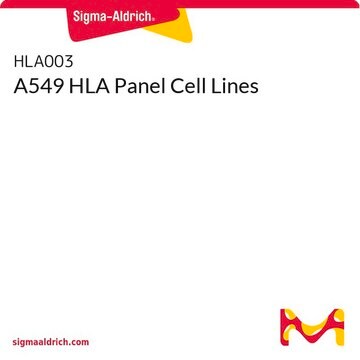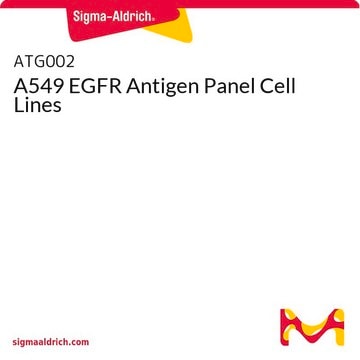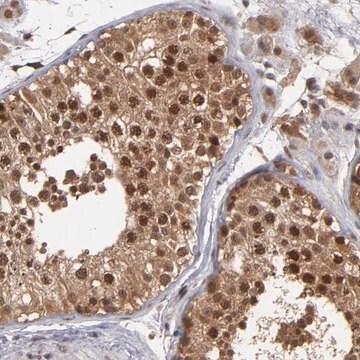推荐产品
product name
Safe Harbor Landing Pad Cell Line A549 Cancer Cells,
生物源
human male lung (Source Disease: Carcinoma)
品質等級
形狀
frozen liquid (Vial of Frozen Cells)
增長模式
Adherent
技術
cell culture | mammalian: suitable
運輸包裝
dry ice
儲存溫度
−196°C
一般說明
The STR profile of this cell line matches that of its parental cell line ATCC® Catalog No. CCL-185a. A549 is a human lung carcinoma cell line isolated in 1972 from a lung tumor of a male patient suffering from carcinoma.
細胞系描述
These cells are a human lung carcinoma cell line isolated from a lung tumor of a 58-year old male suffering from carcinoma. The cells possess a hypotriploid karyotype and express EGFR and mutant KRAS.
應用
This product is a human A549 adenocarcinoma cell line in which a landing pad cassette has been integrated into the AAVS1 safe harbor locus using CompoZr®Zinc Finger Nuclease technology. The mKATE2 fluorescence gene was integrated following the EF1a promoter and flanked by unique Cre-lox sites. The design of this landing pad cassette allows for easy, fast, and affordable genetic modification using Cre recombinase. mKATE2 can easily be exchanged for a payload of the user′s choice using Cre recombinase and a targeting vector with appropriate lox sites. Cells can then be sorted via fluorescence-activated cell sorting (FACS) for loss of mKATE2 expression as a surrogate for successful integration of the targeting vector. Approximately 7-10 days are required for loss of the mKATE2 signal in successfully targeted cells. See technical bulletin for detailed protocols.
特點和優勢
These cells contain the mKATE2 fluorescence gene flanked by unique Cre-lox sites inserted in the AAVS1 safe harbor gene. These A549 cells are adherent with a doubling time of approximately 22 hours.
品質
Tested for Mycoplasma, bacterial and fungal content, post-freeze viability, short terminal repeat (STR) analysis for cell line identification.
培養基
RPMI modified to contain 2mM L-glutamine, 10mM HEPES, 1mM sodium pyruvate, and 1500mg/L sodium bicarbonate. Add 10% FBS(Catalog Number F2442).
法律資訊
ATCC is a registered trademark of American Type Culture Collection
CompoZr is a registered trademark of Merck KGaA, Darmstadt, Germany
儲存類別代碼
10 - Combustible liquids
水污染物質分類(WGK)
WGK 3
閃點(°F)
Not applicable
閃點(°C)
Not applicable
Huseyin Tas et al.
PloS one, 10(9), e0136963-e0136963 (2015-09-04)
We describe an optimized system for the easy, effective, and precise modification of the Escherichia coli genome. Genome changes are introduced first through the integration of a 1.3 kbp Landing Pad consisting of a gene conferring resistance to tetracycline (tetA)
Zhong-Wei Du et al.
Stem cells (Dayton, Ohio), 27(5), 1032-1041 (2009-05-06)
To circumvent the silencing effect of transgene expression in human embryonic stem cells (hESCs), we employed the Cre recombination-mediated cassette exchange strategy to target the silencing-resistant site in the genome. We have identified new loci that sustain transgene expression during
Kimi Araki et al.
Nucleic acids research, 30(19), e103-e103 (2002-10-05)
The Cre-lox system is an important tool for genetic manipulation. To promote integrative reactions, two strategies using mutant lox sites have been developed. One is the left element/right element (LE/RE)-mutant strategy and the other is the cassette exchange strategy using
我们的科学家团队拥有各种研究领域经验,包括生命科学、材料科学、化学合成、色谱、分析及许多其他领域.
联系技术服务部门








